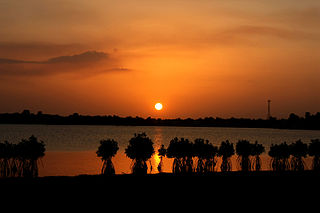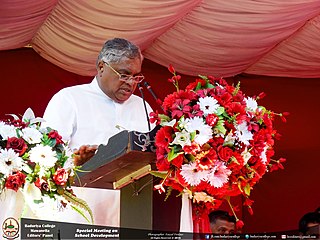Wewatenna | |
|---|---|
Village | |
 | |
| Coordinates: 7°06′08″N81°03′16″E / 7.1021°N 81.0544°E | |
| Country | |
| Province | Central Province |
| Time zone | UTC+5:30 (Sri Lanka Standard Time) |
Wewatenna is a village in Sri Lanka. It is located within Central Province.
Wewatenna | |
|---|---|
Village | |
 | |
| Coordinates: 7°06′08″N81°03′16″E / 7.1021°N 81.0544°E | |
| Country | |
| Province | Central Province |
| Time zone | UTC+5:30 (Sri Lanka Standard Time) |
Wewatenna is a village in Sri Lanka. It is located within Central Province.

Provinces are the first level administrative divisions of Sri Lanka. Currently, Sri Lanka is divided into 9 provinces. Each province is further divided into districts, which are further divided into divisional secretariats.

Islam is the third largest religion in Sri Lanka, with about 9.7 percent of the total population following the religion. About 1.9 million Sri Lankans adhere to Islam as per the Sri Lanka census of 2012. The majority of Muslims in Sri Lanka are concentrated in the Eastern Province of the island. Other areas containing significant Muslim minorities include the Western, Northwestern, North Central, Central and Sabaragamuwa provinces. Muslims form a large segment of the urban population of Sri Lanka and are mostly concentrated in major cities and large towns in Sri Lanka, like Colombo. Most Sri Lankan Muslims primarily speak Tamil, though it is not uncommon for Sri Lankan Muslims to be fluent in Sinhalese. The Sri Lankan Malays speak the Sri Lankan Malay creole language in addition to Sinhalese and Tamil.

The Eastern Province is one of the nine provinces of Sri Lanka, the first level administrative division of the country. The provinces have existed since the 19th century but did not have any legal status until 1987 when the 13th Amendment to the Constitution of Sri Lanka established provincial councils. Between 1988 and 2006 the province was temporarily merged with the Northern Province to form the North Eastern Province. The capital of the province is Trincomalee. Kalmunai is the largest and most populous city of Eastern Province.

North Western Province is a province of Sri Lanka. It is the fourth-largest province by land area, covering 7,888 km2 (3,046 sq mi), and the fourth-most populated province with a population of over 2,592,000 people. North Western Province is bordered by the North Central Province, Sri Lanka to the north, Central Province, Sri Lanka to the east, Sabaragamuwa Province to the southeast, Western Province, Sri Lanka to the south, and is bounded by the Indian Ocean to the west.

North Central Province is one of the nine provinces of Sri Lanka. The province has an area of 10,472 km2, making it the largest province by area, and a population of 1,266,663, making it the 3rd least populated province. The city of Anuradhapura is the capital of the province.

The following outline is provided as an overview of and topical guide to Sri Lanka:

The Central Province is one of the nine provinces of Sri Lanka. The province has an area of 5,674 km2 and a population of 2,421,148, making it the 2nd most populated province. The city of Kandy stands as its capital since 1469.

Sri Lanka Rugby is the governing body for rugby union in Sri Lanka. It is one of the oldest governing bodies in the world, being founded as the Ceylon Rugby Football Union in 1908.
Janaka Bandara Tennakoon is a Sri Lankan politician, a member of the Parliament of Sri Lanka and a former Cabinet Minister. He was educated at Dharmaraja College, Kandy. He contested as the Group Leader of the Matale District of the Central Province and was elected to the Provincial Council with a majority of Proportional Votes in 1993; Elected as a Member of Parliament with a majority of proportional votes in the General Election of 1994; Elected as a Member of Parliament from the District of Matale with the majority of proportional votes in the general election of 2000. He also previously served as the Minister of Lands and Land Development and Minister of Public Services, Provincial Councils and Local Government.

The Northern Province is one of the nine provinces of Sri Lanka. The province has an area of 8,884 km2, making it the 3rd largest province by area, and a population of 1,061,315, making it the least populated province. Jaffna is the capital city of the province.
Kandy (Mahanuwara) electoral district is one of the 22 multi-member electoral districts of Sri Lanka created by the 1978 Constitution of Sri Lanka. The district is conterminous with the administrative district of Kandy in the Central province. The district currently elects 12 of the 225 members of the Sri Lankan Parliament and had 970,456 registered electors in 2010.
Matale electoral district is one of the 22 multi-member electoral districts of Sri Lanka created by the 1978 Constitution of Sri Lanka. The district is conterminous with the administrative district of Matale in the Central province. The district currently elects five of the 225 members of the Sri Lankan Parliament and had 342,684 registered electors in 2010.
Nuwara Eliya electoral district is one of the 22 multi-member electoral districts of Sri Lanka created by the 1978 Constitution of Sri Lanka. The district is conterminous with the administrative district of Nuwara Eliya in the Central province. The district currently elects 7 of the 225 members of the Sri Lankan Parliament and had 457,137 registered electors in 2010.
Polonnaruwa electoral district is one of the 22 multi-member electoral districts of Sri Lanka created by the 1978 Constitution of Sri Lanka. The district is conterminous with the administrative district of Polonnaruwa in the North Central province. The district currently elects 5 of the 225 members of the Sri Lankan Parliament and had 280,337 registered electors in 2010.
Scientific research in Sri Lanka is carried out by several research institutions. However, historically, Sri Lanka has been behind its regional peers in research funding. Sri Lanka was ranked 95th in the Global Innovation Index in 2021.

Northern Provincial Council is the provincial council for the Northern Province in Sri Lanka. In accordance with the Sri Lankan constitution, NPC has legislative power over a variety of matters including agriculture, education, health, housing, local government, planning, road transport and social services. The constitution also gives it powers over police and land but successive central governments have refused to devolve these powers to the provinces. NPC has 38 members elected using the open list proportional representation system.

Maheepala Herath is a Sri Lankan politician. The current Governor of the North Central Province, he was the former Chief Minister of Sabaragamuwa Province of Sri Lanka. He belongs to the Sri Lanka Freedom Party and part of the United People's Freedom Alliance.
Provincial governments of Sri Lanka are the devolved governments of the nine Provinces of Sri Lanka. In accordance with the Sri Lankan constitution, provinces have legislative power over a variety of matters including agriculture, education, health, housing, local government, planning, road transport and social services. The constitution also gives them powers over police and land but successive central governments have refused to devolve these powers to the provinces.

COVID-19 vaccination in Sri Lanka is an ongoing immunisation campaign against severe acute respiratory syndrome coronavirus 2 (SARS-CoV-2), the virus that causes COVID-19, in response to the ongoing pandemic in the country. As of late July, the Sinopharm BIBP vaccine accounted for 78% of the total 13.8 million vaccines obtained by Sri Lanka to date. The United States donated over 1.5 million Moderna vaccine through COVAX.